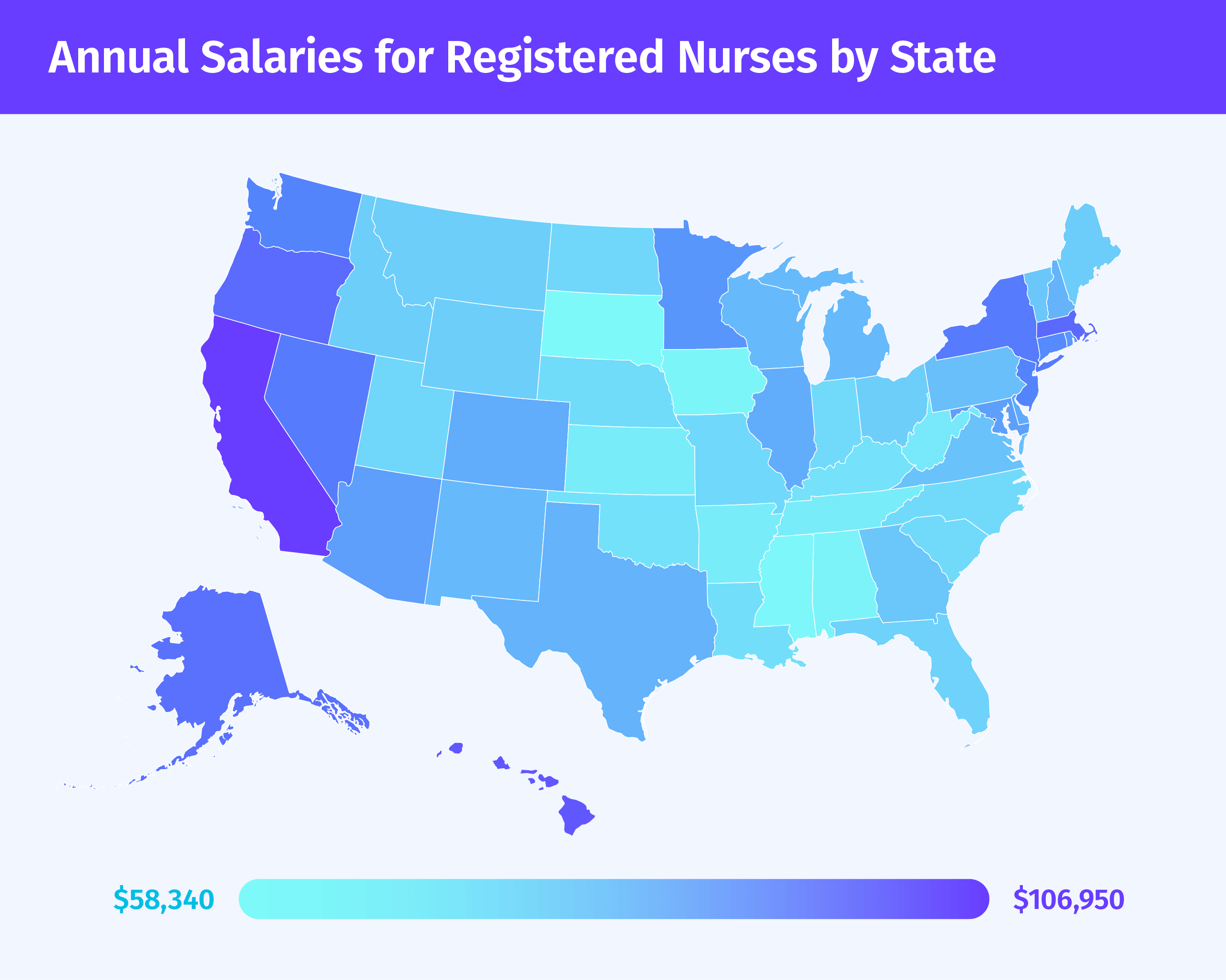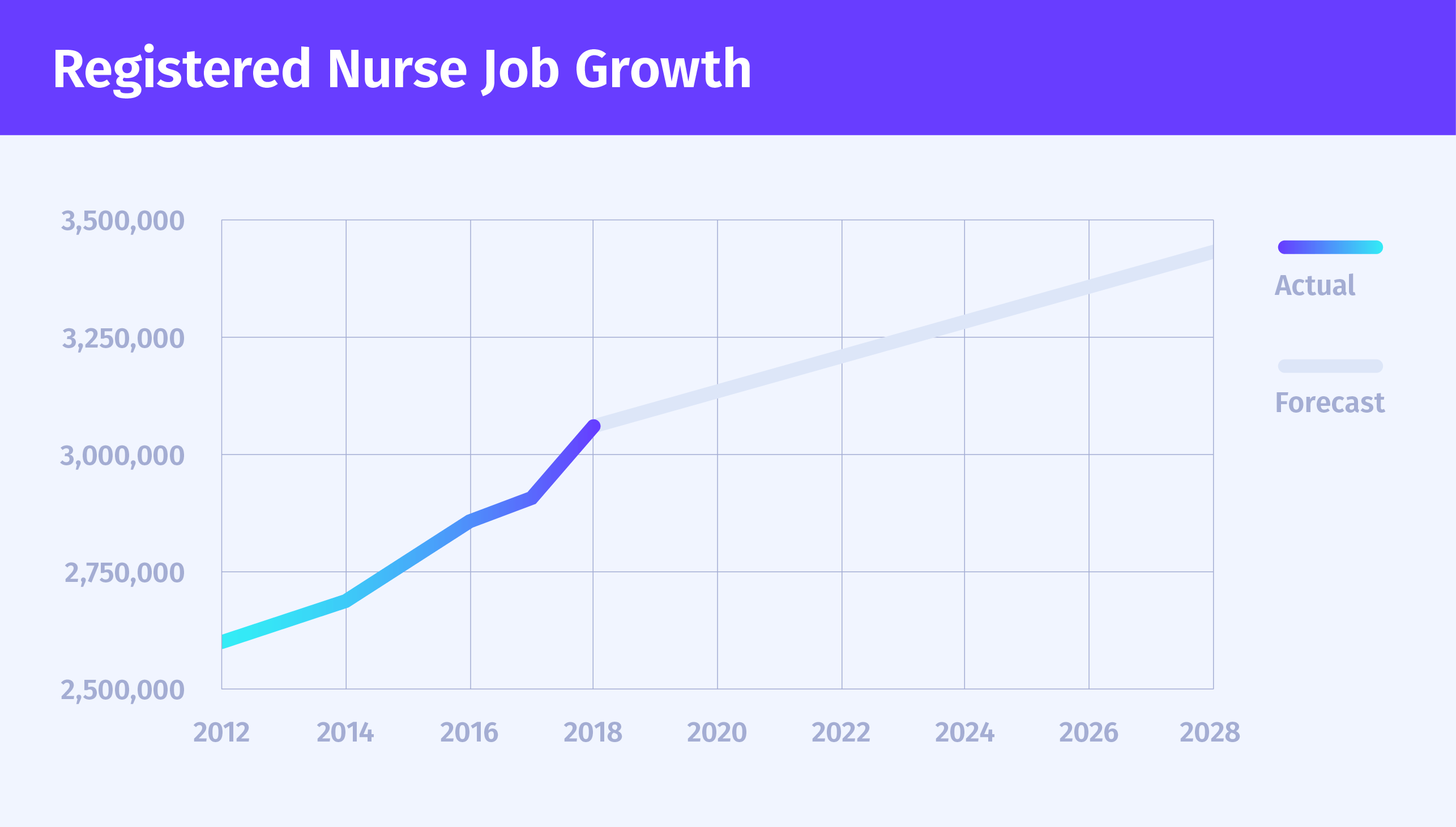- What is a Registered Nurse?
- Where do Registered Nurses Work?
- The Difference Between an LPN and an RN
- How to Become a Registered Nurse
- Educational Requirements to Become a Registered Nurse
- The Different Types of Registered Nurses
- Registered Nurse Salaries by State
- Registered Nurse Job Outlook
- Frequently Asked Questions (FAQs)
- Registered Nurse Resources
- Final Thoughts
What Is a Registered Nurse?
Registered nurses are nurses that hold a nursing diploma, Associate Degree in Nursing (ADN) or a Bachelor of Science in Nursing (BSN), and have passed the NCLEX-RN exam. The point of licensure is to assure people that the nurse has met a set of standards issued by a governmental entity. This protects the public from unprepared or incompetent practitioners who might otherwise cause harm to the public. There is a movement to encourage RNs to start their career with a BSN before licensure or after they become an RN so as to expand their expertise.
You’re reading one of our “Nursing Career Guide” articles. Need to practice for your upcoming exam? Take our free NCLEX practice test -- no registration required! ✨
The type of work that RNs do falls under is called a “scope of practice”. This scope of practice is used to describe the services and procedures that an RN is qualified or not qualified to perform. Each state has its own board of nursing (BON) that governs the standards, scope of practice, and licensing requirements for nurses in that state. The point of the BON is to set standards and predetermined qualifications that individuals must meet to practice nursing.
One thing that is common to all nurses regardless of the state in which they reside is the necessity to pass the NCLEX-RN exam. Since every RN must pass the NCLEX-RN, the exam is the best way to determine an RN’s ability to perform a scope of practice common to all RNs.
According to the National Council of State Boards of Nursing (NCSBN), an RN’s scope of practice includes:
- Management of Care
- Safety and Infection Control
- Health Promotion and Maintenance
- Psychosocial Integrity
- Basic Care and Comfort
- Pharmacological and Parenteral Therapies
- Reduction of Risk Potential
- Physiological Adaptation
Where Do Registered Nurses Work?
When most people think of nurses they think of people wearing blue scrubs in a hospital. While nurses can of course be found in hospitals, they also work in a variety of other settings that you may not have known about. Here are a few of the locations that RNs can typically be found working, as well as some of the more obscure locations RNs work:
- Hospitals
- Emergency Rooms
- Clinics
- Intensive Care Units
- Assisted Living Facilities
- Community Centers
- Schools
- Colleges
- Research Labs
- Camps
- Missionary Clinics
- Emergency Vehicles
- Correctional Facilities
- Patient Homes
Part of the education process for becoming a nurse is to gain clinical practice experience. Typically, this clinical learning can take place in a variety of different health care centers from trauma clinics to community centers and non-profit clinics. The clinical experience is usually completed under the close supervision and instruction of a preceptor. Nurse preceptors are experienced nurses who teach, support, and counsel newly graduated nurses to help them gain the clinical skills and experience.
The Difference Between an LPN and an RN
Licensed practical nurses (LPNs) are nurses that work under the supervision of doctors and RN’s and provide patients with basic care such as taking vital signs, collecting samples, administering medication and making sure patients are comfortable. In Texas and California LPNs are known as licensed vocational nurses (LVNs).
The difference between an LPN and an RN comes down to two factors: education and experience. LPNs are required to complete an accredited nursing program which takes about one year on average. These accredited nursing programs are typically taken at a technical or community college and graduates receive a certification in practical nursing. After receiving a certificate, prospective nurses are then required to take and pass the NCLEX-PN exam to become an LPN. Here are some of the characteristics of LPNs:
- Provide less skilled care for patients
- Work under the direct supervision of a doctor or an RN
- Considered an entry level nurse status
- Responsible for basic bedside care and patient comfort
- Lower salary than RNs
Becoming an RN typically takes between 2-4 years depending on whether you choose to get a nursing diploma, associates degree in nursing (ADN), or a bachelor’s of science in nursing (BSN) degree. RNs have more education and clinical experience than LPNs and have more responsibilities. Here are some of the characteristics of RNs:
- Provide higher skilled nursing
- Can educate patients regarding medical conditions
- Provide emotional support
- Analyze test results
- Perform diagnostic tests
- Administer treatments and therapies
- Record patients conditions
- Consult with doctors.
- Higher salary than LPNs
How to Become a Registered Nurse
The path to becoming a registered nurse consists of meeting certain educational requirements, gaining clinical experience, and passing the NCLEX-RN exam. This process usually takes around 2-4 years depending on the educational route taken and how well you prepare for the NCLEX-RN exam.
Listed below are the four steps you need to take to become a registered nurse:
- 1
Complete an Accredited Nursing Degree Program
There are three educational paths that you can take to become a registered nurse. The first option is to obtain a nursing diploma. This is the fastest option and you can usually complete the course in about 1-3 years time. Nursing diploma programs are typically offered at technical schools and community colleges and represent the minimum educational requirements needed to become an RN. Nursing programs are less common than ADN and BSN degree programs and are often associated with a specific hospital.
The second option is to obtain an associates degree in nursing (ADN). This is the second fastest educational option to become an RN and usually takes 2 years to complete. The difference between an ADN and a nursing diploma is that graduates with an ADN earn a college degree rather than a certificate. Both the nursing program and the ADN prepare students to take the NCLEX-RN exam. But graduates with an ADN degree have the added benefit of being able to transfer their credits toward a BSN degree if they decide to pursue this path. This is known as an RN to BSN “bridge” program which enables you to work as an RN while concurrently working towards a BSN degree.
The third option is to complete a bachelor of science in nursing degree (BSN). It typically takes 4 years to complete a BSN degree as it is the closest to a standard baccalaureate degree. This educational path provides students with the greatest amount of education and clinical practice possible which provides the best preparation for passing the NCLEX-RN exam. Generally, RNs with a BSN degree start out at a higher salary and have more options for career advancement than the other two options.
- 2
Pass the NCLEX-RN Exam
The National Council Licensure Examination (NCLEX-RN) exam is developed by the National Council of State Boards of Nursing (NCSBN). Passing the exam is required for an individual to obtain a nursing license and practice nursing in the state in which they have met requirements. The exam is taken after receiving a diploma or degree and consists of at least 90 percent multiple-choice questions with the rest being alternate format questions.
The exam is currently administered by Pearson VUE with testing facilities located in all 50 states. The exam is taken by computer and there is a maximum time limit of 6 hours to complete the exam with a mandatory 10 minute break at the 2.5 hour mark and an optional break at the 4 hour mark. Additional breaks may be taken but that will count against the overall time limit for the exam.
Based on the answers that are given during the test, an individual may be given between 75 to 265 questions. Only 60 of the first 75 questions count toward the overall score and the remainder known as “trial” questions are used to determine questions for future exams. There isn’t a definitive number of questions that you must answer correctly to pass the test, rather each exam is graded based on a set of predetermined criteria.
- 3
Obtain State Licensure
After passing the NCLEX-RN exam, an individual will then qualify to receive their RN license in the state in which they applied. The license is granted by the state board of nursing (BON) and shows that an individual has met the criteria necessary to practice under a unique scope of practice. To obtain the license, an individual must apply to their state BON where they will verify graduation from an accredited nursing program, verify the successful completion of the NCELX-RN exam, and in some states verify a criminal background check.
- 4
Get Hired as an RN
The last step to becoming an RN is to land your first job. All of the hard work and dedication has paid off and now you can call yourself an RN. The goal is to find job opportunities in a setting that interests you and continue applying until you receive your first job offer. This is also where it becomes beneficial to have a BSN degree as having one will give you an edge over candidates with less education and clinical experience. Regardless of how you obtained your RN license, this is a major milestone as it is the beginning of your career in the nursing field.
Educational Requirements to Become a Registered Nurse
There are three primary ways in which you can become a registered nurse. Each path takes varying degrees of education, clinical experience, and time to complete. However, each option is not equal in terms of initial job placement and opportunities for advancement. In general, employers prefer candidates who have acquired more educational experience prior to initial licensure. This can mean it is easier for candidates with a BSN degree to land their first job and to work in a preferred position with a higher starting salary.
Regardless of which path you take, becoming an RN is an excellent way to enter a career with a high starting salary and plenty of options for career advancement. Below you will find the three educational pathways that will lead you to becoming a registered nurse.
Nursing Diploma
Nursing diploma programs on average take 1-3 years to complete and prepare students to take the NCLEX-RN exam. Nursing diploma programs used to be the main way to become a nurse but these types of programs are being slowly phased out in favor of the associates degrees in nursing (ADN). These types of programs are not a fast track method of becoming a nurse as they typically take the same amount of time as obtaining an ADN degree.
Most nursing diploma programs are developed by host hospitals, usually in conjunction with a nursing school or community college. At the end of the program, students receive a certificate rather than a college degree.
How long it takes: 1-3 years
Average starting salary: $56k (*)
Associates Degree in Nursing (ADN)
The associates degree in nursing (ADN) is a college degree program designed to prepare students for a career in nursing. Unlike a nursing diploma program, the ADN degree is a college degree with a curriculum that includes liberal arts classes in addition to the nursing specific courses. One advantage of the ADN degree is that it allows you to start working as an RN sooner than if you were to complete your BSN before becoming licensed. This opens up the opportunity to start working as a registered nurse while also completing an RN to BSN program also known as a “bridge” program. This program allows you to work as an RN while also taking the additional classes needed to obtain your BSN degree.
Overall, the cost of obtaining an ADN is lower than obtaining a BSN. There are more schools to choose from as ADN programs are typically offered at community colleges. When just starting your nursing career, the difference in salary between an ADN and a BSN isn’t very significant. For some people pursuing an ADN degree is an attractive option as it allows you to become an RN sooner than if you were to pursue a BSN degree.
How long it takes: 2-3 years
Average starting salary: $61k (*)
Bachelor of Science in Nursing (BSN)
Earning a BSN degree can open the door to opportunities that the other educational pathways may not be able to. As a highly educated nurse, the opportunities available to you are greater and the starting salary higher than either an ADN or nursing diploma. The BSN degree is rapidly becoming the gold standard of education for aspiring RNs. Over the past few years there has been a trend of employers, professional associations, and medical community members encouraging prospective nurses to complete a BSN as the preferred educational pathway to becoming an RN. Some hospitals are now requiring new nursing hires to have a BSN degree which makes it a wise choice to pursue a BSN as the foundation for your career in nursing.
Registered nurses with a BSN degree are able to choose a wide variety of practice specialties and are more likely to be considered for supervisory and management positions. Having a BSN degree is also good for patients as BSN educated nurses have better patient outcomes and are associated with lower patient mortality rates.
How long it takes: 4 years
Average starting salary: $65k (*)
The Different Types of Registered Nurses
One of the interesting things about becoming a registered nurse is that there are a multitude of different types of nursing that allow you to specialize in a specific area of practice. The benefit of this is that you get to spend your time working in an environment that suits your unique interests and skill set. Specialization usually occurs after you gain enough hours and experience as an entry level nurse. This allows you enough time to experience different areas of practice and work with various patient populations.
While registered nurses may pursue some types of specialization without additional education, there are certain sub-specialities that only nurses with advanced degrees may specialize in. These nurses are known as advanced practice registered nurses (APRNs).
Advanced Practice Registered Nurse (APRN)
Advanced practice registered nurses are RNs that have pursued further education and have earned a graduate level degree such as a masters of science in nursing (MSN) or a doctor of nursing practice (DNP). In addition to the graduate level education, APRNs have also been specially trained in one of four APRN roles: certified nurse midwife (CNM), clinical nurse specialist (CNS), certified registered nurse anesthetist (CRNA) and certified nurse practitioner (CNP).
In addition to the four APRN roles, there are six “population foci ” that APRNs can choose from based on the consensus model for APRN regulation. These consist of six different population types and similar to the four APRN roles, allow for specialization within a specific patient population. Here are the six population foci:
- Adult-Gerontology
- Family/Individual Across Lifespan
- Neonatal
- Pediatrics
- Psychiatric-Mental Health
- Women’s Health/Gender-Related
- Psychiatric-Mental Health
There are many focuses of practice that go beyond role and population. These are known as APRN sub-specialties and include the following:
- Acute care
- Cardiovascular
- Infectious disease
- Oncology
- Parent-child
- Perinatal
- Rehabilitation
Registered Nurse Salaries by State
For most people the educational requirements and experience it takes to become an RN are worth the effort. Becoming an RN is a lucrative career path since RNs earn high salaries with high job satisfaction scores.
If you’d like to know what kind of salary you can expect to earn in your state, we’ve put together a chart that includes the employment, hourly wage, and annual wage that you can expect to earn. The data comes from the U.S. Bureau of Labor Statistics (BLS) which is a governmental agency that provides employment data and statistics for each state.
If you are interested in a deeper breakdown, check out our guide on how much do registered nurses make.

| State | Employment | Hourly mean wage | Annual mean wage |
|---|---|---|---|
| Alabama | 49,490 | $28.59 | $59,470 |
| Alaska | 5,730 | $42.94 | $89,310 |
| Arizona | 54,690 | $37.02 | $77,000 |
| Arkansas | 25,380 | $29.22 | $60,780 |
| California | 294,510 | $51.42 | $106,950 |
| Colorado | 51,760 | $35.69 | $74,240 |
| Connecticut | 31,400 | $39.05 | $81,220 |
| Delaware | 11,840 | $35.96 | $74,800 |
| Florida | 177,600 | $31.83 | $66,210 |
| Georgia | 76,640 | $33.15 | $68,950 |
| Hawaii | 11,310 | $47.16 | $98,080 |
| Idaho | 13,790 | $32.26 | $67,110 |
| Illinois | 129,400 | $35.53 | $73,890 |
| Indiana | 67,870 | $31.18 | $64,860 |
| Iowa | 33,770 | $28.43 | $59,130 |
| Kansas | 27,810 | $29.34 | $61,030 |
| Kentucky | 46,130 | $30.34 | $63,100 |
| Louisiana | 43,110 | $30.76 | $63,970 |
| Maine | 14,460 | $32.51 | $67,610 |
| Maryland | 54,080 | $36.93 | $76,820 |
| Massachusetts | 80,630 | $44.30 | $92,140 |
| Michigan | 96,680 | $34.29 | $71,330 |
| Minnesota | 69,000 | $37.94 | $78,920 |
| Mississippi | 29,860 | $28.12 | $58,490 |
| Missouri | 71,770 | $31.31 | $65,130 |
| Montana | 10,100 | $32.43 | $67,450 |
| Nebraska | 22,970 | $31.00 | $64,470 |
| Nevada | 22,560 | $41.16 | $85,620 |
| New Hampshire | 13,630 | $34.98 | $72,760 |
| New Jersey | 79,530 | $39.78 | $82,750 |
| New Mexico | 16,730 | $34.49 | $71,730 |
| New York | 182,490 | $41.16 | $85,610 |
| North Carolina | 102,500 | $31.18 | $64,850 |
| North Dakota | 8,770 | $31.61 | $65,740 |
| Ohio | 125,380 | $32.13 | $66,820 |
| Oklahoma | 29,330 | $30.33 | $63,080 |
| Oregon | 36,020 | $43.79 | $91,080 |
| Pennsylvania | 148,520 | $33.84 | $70,390 |
| Rhode Island | 12,630 | $37.70 | $78,420 |
| South Carolina | 44,350 | $31.22 | $64,940 |
| South Dakota | 12,760 | $28.05 | $58,340 |
| Tennessee | 60,360 | $29.48 | $61,320 |
| Texas | 210,350 | $35.04 | $72,890 |
| Utah | 21,700 | $31.57 | $65,670 |
| Vermont | 6,460 | $33.25 | $69,160 |
| Virginia | 64,750 | $33.55 | $69,790 |
| Washington | 56,290 | $39.75 | $82,670 |
| West Virginia | 19,930 | $29.70 | $61,780 |
| Wisconsin | 59,030 | $34.36 | $71,470 |
| Wyoming | 5,010 | $32.38 | $67,360 |
Registered Nurse Job Outlook
With a projected job growth rate of 12% through 2028, registered nurses have an excellent job outlook with a growth rate much faster than the average for all occupations. One of the major factors driving this growth is the demand for healthcare services from the aging population. Older people tend to have more health issues that require medical care such as arthritis, dementia, diabetes, and obesity.
There is also a growing tendency where hospitals discharge patients quickly due to financial reasons leading to an increase in the number of people that are admitted to long-term care facilities, outpatient care centers, and that need in-home healthcare. This preference to be treated at home or in residential care facilities is increasing the demand for registered nurses in these types of settings.
Another factor contributing to the strong job growth is that nurses are leaving the workforce due to retirement. The average age of nurses is over 50 years old and growing. According to the Health Resources and Services Administration in the 10-15 years more than one million registered nurses will be retiring. This means there will be an increased demand for nurses in the foreseeable future as these retiring nurses will need to be replaced.
With all of the factors mentioned above, the overall job growth for registered nurses is expected to be excellent. Below you will find a chart highlighting the employment projections for registered nurses through 2028:

Frequently Asked Questions (FAQs)
How many years does it take to become a registered nurse?
It takes on average 1-4 years to become a registered nurse. The length of time it takes depends on which educational pathway you pursue, as well as the course load you are taking. If you are taking classes full time, a realistic timeline for becoming a nurse is around 2 years. This is assuming you are pursuing a nursing diploma or an ADN degree. If you decide to pursue a BSN degree this will take 4 years as the curriculum is close to that of a standard bachelor’s degree.
What is the quickest way to become a registered nurse?
The quickest way to become a registered nurse is to pursue a nursing diploma from an accredited nursing program. It takes an estimated 1-3 years to earn a nursing diploma. These types of programs are in decline. Employers, professional associations, and medical community members encourage prospective nurses to obtain a 4 year BSN degree as the initial path to licensure. Another option is to pursue an associates degree in nursing (ADN). An ADN degree takes on average 2 years, which is a similar amount of time compared to a nursing diploma program. The benefit of an ADN over a nursing diploma is that the ADN is an actual college degree and can count toward a BSN degree if you choose to pursue that option.
What qualifications do you need to be a nurse?
All nurses must meet certain education requirements, clinical hours, and pass the NCLEX-RN exam. There are three paths you can take to meet the education requirements:
- A nursing diploma
- An associates degree in nursing (ADN)
- A bachelor of science in nursing degree (BSN)
All three educational pathways will require a certain amount of clinical hours where you will learn nursing best practices and gain real world experience. After obtaining the necessary education and clinical hours, you will qualify to take the NCLEX-RN exam which will allow you to obtain your nursing license.
How hard is it to become a registered nurse?
Becoming a nurse can be a challenging endeavor but on the other side of the challenge is a rewarding career with a high starting salary, excellent benefits, and opportunity for advancement. Most people who enter nursing school do eventually get their RN license. Most people find it to be challenging but not overwhelming.
Can I become an RN in 2 years?
Yes. There are two ways in which you can become a registered nurse in 2 years. The first option is to attend a nursing program that offers a nursing diploma at graduation. These programs usually take between 1-3 years to complete. The second option is to pursue an ADN degree which takes 2 years to complete on average. Receiving an ADN degree is the better of the two options as it allows you to pursue an RN to BSN “bridge” program. This allows you to work as an RN while finishing the remaining 2 years of schooling needed to obtain your BSN degree. Regardless of which option you choose to take, all prospective nurses will need to take the NCLEX-RN exam which is the final step to become a registered nurse.
Registered Nurse Resources
Below you will find a list of helpful resources meant for prospective nurses as well as those that are already working in the field. Many of these organizations provide free educational resources, support, and education which makes it worthwhile to browse through each organization’s website. It’s important to familiarize yourself with the different nursing organizations as they are often on the front line of issues facing registered nurses, making them important sources of information for RNs.
National Council of State Boards of Nursing (NCSBN)
The National Council of State Boards of Nursing (NCSBN) is an organization that brings together multiple nursing regulatory bodies to develop policy and nursing licensure exams. The mission of the NCSBN is to empower and support nursing regulators in their mandate to protect the public.
American Nurses Association (ANA)
The American Nurses Association is an organization that represents the nations 3.5 million registered nurses and advances the nursing profession by promoting high standards of nursing practice, safe and ethical working conditions, improving the health and wellness of nurses and advocating on health related issues that affect nurses and the public.
American Society of Registered Nurses (ASRN)
The American Society of Registered Nurses was founded for the purpose of bringing together nurses to expand the study and practice nursing while providing members with support, resources, and education. The ASRN represents a community of nurses with the goal of advancing nursing as a science and profession.
National League for Nursing (NLN)
The National League for Nursing (NLN) is a resource for nurse educators and offers professional development, networking opportunities, teaching resources, research grants, testing services, and advocating for public policy initiatives.
National Student Nurses’ Association (NSNA)
The National Student Nurses’ Association (NSNA) is a nonprofit organization dedicated to helping students in associate, baccalaureate, and diploma programs foster professional development and mentor students preparing for initial licensure as registered nurses.
American Organization for Nursing Leadership (AONL)
The American Organization for Nursing Leadership (AONL) provides access to resources, programs, and connections to help those in the nursing community succeed. Their mission is to shape healthcare through innovative and expert nursing leadership.
Final Thoughts
The decision to become a nurse might be one of the most important decisions you’ll ever make. Nurses earn salaries that are significantly higher than average and nurses have the opportunity to make a positive impact in the communities they serve. In addition to being highly paid, registered nurses report a high level of job satisfaction.
If you’re interested in starting a career as a registered nurse or you are already enrolled in a nursing program, the next step should be to begin studying for the NCLEX exam. Here at Nurse.plus we are committed to providing you with the highest quality study materials to help you succeed as a nurse.
We’ve created a comprehensive NCLEX study guide that will help you pass on the first try. If you’d like to see what the exam is like and want to get started on becoming a registered nurse, check out our free NCLEX practice questions below.
 By
By 



